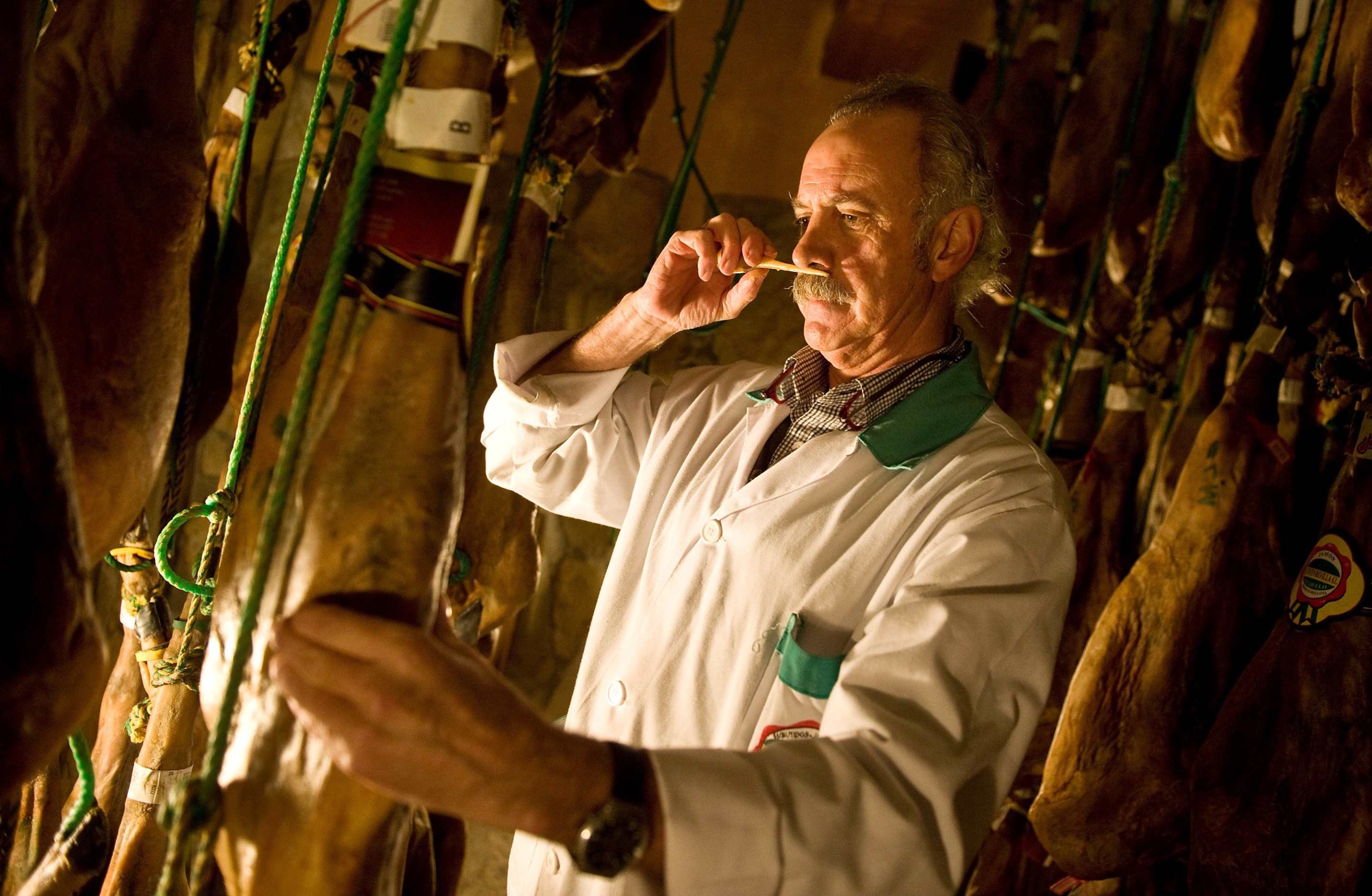Christmas is just around the corner. Families everywhere are preparing for festive dinners adorned with all kinds of delectable meats, vegetables, fruits, grains, and sweets. Many of you, specifically, may be set to enjoy some particularly juicy and delicious Christmas ham. But before eating, ask yourself this very important question: Has your pork been sniffed by a trained and certified professional?
You see, I have just learned about the most amazing job, and now I must have it. This week in the Wall Street Journal, Richard Morgan profiled the ham sniffers at Plaza del Jamón in Andalusia, Spain, where the company Cinco Jotas produces Iberian ham. The descriptions of the ham-making process, with its oak fires smoking hanging sausages, are enough to prompt stomach rumbles just on their own. But the article's main thrust makes my nose positively twitch with curiosity. As part of the quality control protocols at Cinco Jotas, a group of six sniffers (caladors) test the curing process by poking the pork loin in four different places and then taking a whiff, searching for hints in its scent that would betray a meat that will be less than satisfactory on its eventual table.
Incredible, no? My imagination goes haywire at the thought of such a place—a world across the ocean where the rooms are filled with nothing but ham and the devoted noses that smell the ham. But, even if they immediately have the most enthralling answer to "What do you do?" at any party they walk into, it's not all fun and games for ham sniffers, who have built their lives around this olfactory craft and are furiously busy during the holiday season. In fact, it appears that this factory badly needs to hire more sniffers! From the article:
During low season, in February, Mr. Vega will smell 200 hams a day, he said. Now at the climax of demand he is whiffing 800 loins a day—that’s 3,200 sniffs. He is strained, he said, “at the limit of human possibility.” He has started taking 10-minute breaks every two hours.
And if demand increases? “I will find a way to sniff 801,” he said. “Perhaps 802 is possible.”
Mr. Vega, you do not need to stretch your nose any further. I would be honored to volunteer my services as a sniffing apprentice in your ham factory, if only until demand dies down later in the winter. I would be good at it, I promise! Look at how much I already have in common with you, the leader in your field:
Terrified of contracting the ever-mutating coronavirus, which destroys some people’s sense of smell, Mr. Vega says he eats six oranges a day to boost his immune system. The company said none of the sniffers has contracted the virus.
I, too, am terrified of contracting the ever-mutating coronavirus, which is why I have been vaccinated on three different occasions this year. I do not eat six oranges a day, but I believe that an overall average of one vaccine dose every three months or so is roughly equivalent to the orange thing. If my current orange consumption is unacceptable, I will happily tweak that habit for you.
Mr. Vega’s nighttime ablutions to maintain his sense of smell include a steaming mug of Pennyroyal tea, a wild local mint he picks himself. He hopes his wife never changes her perfume—Lancôme’s La Vie Est Belle—as his nose was recently thrown when he switched to an anti-baldness shampoo.
I do not use anti-baldness shampoo. Sounds like I'm already a step ahead of the game! Maybe you could even learn a thing or two from me, huh?
The similarities don't even end with Vega. As a woman who lives with extraordinarily advanced nasal capacities, I found this detail about Cristina Sánchez Blanco to be eerily familiar:
She likened her nose to a detective, saying that when her policeman husband comes home she can tell him about his day before he says a word—smelling gasoline from a car crash, soot from a fire or dander from a rescued pet.
When my roommate carries in food, I can almost always tell when I walk into our kitchen. "Smells good," I'll say. And then to avoid freaking her out—because of course I can absolutely identify any and all smells instantly—I'll ask what it is. Every dinner, then, is an opportunity to further refine and reinforce my mind palace's stores of scent information. And because of my vast, rich knowledge and understanding of all smells far and wide, I have no trepidation whatsoever about taking the ham company's smell detector test:
Some hopefuls take as long as an hour on the test. Mr. Vega said he took 10 minutes. “If you doubt yourself, you cannot do this work,” he said, tapping his chest to indicate a gut decision. “If you doubt one, you have to doubt all of them.”
As I am sure this blog has made clear, I do not doubt myself or my nose one single bit, making me eminently qualified to be a ham sniffer. I'll be at the factory first thing tomorrow.






